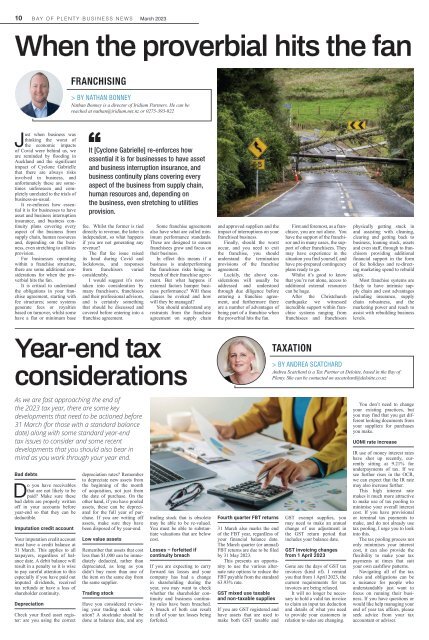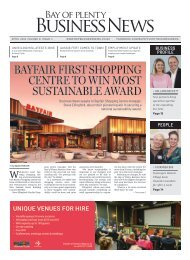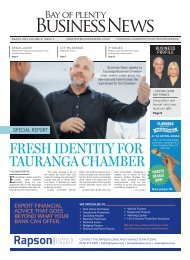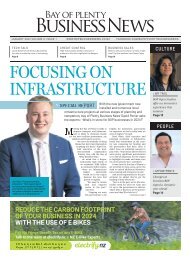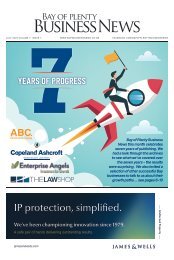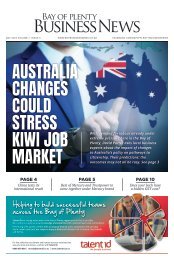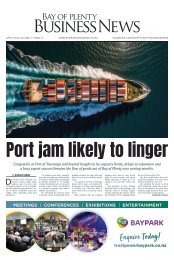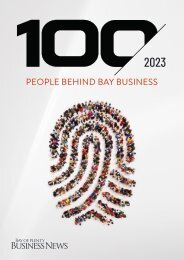March 2023 - Bay of Plenty Business News
From mid-2016 Bay of Plenty businesses have a new voice, Bay of Plenty Business News. This new publication reflects the region’s growth and importance as part of the wider central North Island economy.
From mid-2016 Bay of Plenty businesses have a new voice, Bay of Plenty Business News. This new publication reflects the region’s growth and importance as part of the wider central North Island economy.
Create successful ePaper yourself
Turn your PDF publications into a flip-book with our unique Google optimized e-Paper software.
10 BAY OF PLENTY BUSINESS NEWS <strong>March</strong> <strong>2023</strong><br />
When the proverbial hits the fan<br />
FRANCHISING<br />
> BY NATHAN BONNEY<br />
Nathan Bonney is a director <strong>of</strong> Iridium Partners. He can be<br />
reached at nathan@iridium.net.nz or 0275-393-022<br />
Just when business was<br />
thinking the worst <strong>of</strong><br />
the economic impacts<br />
<strong>of</strong> Covid were behind us, we<br />
are reminded by flooding in<br />
Auckland and the significant<br />
impact <strong>of</strong> Cyclone Gabrielle<br />
that there are always risks<br />
involved in business, and<br />
unfortunately these are sometimes<br />
unforeseen and completely<br />
unrelated to the trials <strong>of</strong><br />
business-as-usual.<br />
It re-enforces how essential<br />
it is for businesses to have<br />
asset and business interruption<br />
insurance, and business continuity<br />
plans covering every<br />
aspect <strong>of</strong> the business from<br />
supply chain, human resources<br />
and, depending on the business,<br />
even stretching to utilities<br />
provision.<br />
For businesses operating<br />
within a franchise structure,<br />
there are some additional considerations<br />
for when the proverbial<br />
hits the fan.<br />
It is critical to understand<br />
the obligations in your franchise<br />
agreement, starting with<br />
fee structures; some systems<br />
generate fees or royalties<br />
based on turnover, whilst some<br />
have a flat or minimum base<br />
It [Cyclone Gabrielle] re-enforces how<br />
essential it is for businesses to have asset<br />
and business interruption insurance, and<br />
business continuity plans covering every<br />
aspect <strong>of</strong> the business from supply chain,<br />
human resources and, depending on<br />
the business, even stretching to utilities<br />
provision.<br />
fee. Whilst the former is tied<br />
directly to revenue, the latter is<br />
independent, so what happens<br />
if you are not generating any<br />
revenue?<br />
The flat fee issue raised<br />
its head during Covid and<br />
lockdowns, and responses<br />
from franchisors varied<br />
considerably.<br />
I would suggest it’s now<br />
taken into consideration by<br />
many franchisors, franchisees<br />
and their pr<strong>of</strong>essional advisors,<br />
and is certainly something<br />
that should be discussed and<br />
covered before entering into a<br />
franchise agreement.<br />
Some franchise agreements<br />
also have what are called minimum<br />
performance standards.<br />
These are designed to ensure<br />
franchisees grow and focus on<br />
their business.<br />
In effect this means if a<br />
business is underperforming<br />
the franchisee risks being in<br />
breach <strong>of</strong> their franchise agreement.<br />
But what happens if<br />
external factors hamper business<br />
performance? Will these<br />
clauses be evoked and how<br />
will they be managed?<br />
You should understand any<br />
restraints from the franchise<br />
agreement on supply chain<br />
and approved suppliers and the<br />
impact <strong>of</strong> interruptions on your<br />
franchised business.<br />
Finally, should the worst<br />
occur, and you need to exit<br />
the franchise, you should<br />
understand the termination<br />
provisions <strong>of</strong> the franchise<br />
agreement.<br />
Luckily, the above considerations<br />
will usually be<br />
addressed and understood<br />
through due diligence before<br />
entering a franchise agreement,<br />
and furthermore there<br />
are a number <strong>of</strong> advantages <strong>of</strong><br />
being part <strong>of</strong> a franchise when<br />
the proverbial hits the fan.<br />
First and foremost, as a franchisee,<br />
you are not alone. You<br />
have the support <strong>of</strong> the franchisor<br />
and in many cases, the support<br />
<strong>of</strong> other franchisees. They<br />
may have experience in the<br />
situation you find yourself, and<br />
have pre-prepared contingency<br />
plans ready to go.<br />
Whilst it’s good to know<br />
that you’re not alone, access to<br />
additional external resources<br />
can be huge.<br />
After the Christchurch<br />
earthquake we witnessed<br />
incredible support within franchise<br />
systems ranging from<br />
franchisees and franchisors<br />
physically getting stuck in<br />
and assisting with cleaning,<br />
clearing and getting back to<br />
business, loaning stock, assets<br />
and even staff, through to franchisors<br />
providing additional<br />
financial support in the form<br />
<strong>of</strong> fee holidays and re-directing<br />
marketing spend to rebuild<br />
sales.<br />
Most franchise systems are<br />
likely to have intrinsic supply<br />
chain and cost advantages<br />
including insurance, supply<br />
chain robustness, and the<br />
marketing power and reach to<br />
assist with rebuilding business<br />
levels.<br />
Year-end tax<br />
considerations<br />
TAXATION<br />
> BY ANDREA SCATCHARD<br />
Andrea Scatchard is a Tax Partner at Deloitte, based in the <strong>Bay</strong> <strong>of</strong><br />
<strong>Plenty</strong>. She can be contacted on ascatchard@deloitte.co.nz<br />
As we are fast approaching the end <strong>of</strong><br />
the <strong>2023</strong> tax year, there are some key<br />
developments that need to be actioned before<br />
31 <strong>March</strong> (for those with a standard balance<br />
date) along with some standard year-end<br />
tax issues to consider and some recent<br />
developments that you should also bear in<br />
mind as you work through your year end.<br />
Bad debts<br />
Do you have receivables<br />
that are not likely to be<br />
paid? Make sure these<br />
bad debts are properly written<br />
<strong>of</strong>f in your accounts before<br />
year-end so that they can be<br />
deductible.<br />
Imputation credit account<br />
Your imputation credit account<br />
must have a credit balance at<br />
31 <strong>March</strong>. This applies to all<br />
taxpayers, regardless <strong>of</strong> balance<br />
date. A debit balance will<br />
result in a penalty so it is wise<br />
to pay careful attention to this<br />
especially if you have paid out<br />
imputed dividends, received<br />
tax refunds or have a loss <strong>of</strong><br />
shareholder continuity.<br />
Depreciation<br />
Check your fixed asset register:<br />
are you using the correct<br />
depreciation rates? Remember<br />
to depreciate new assets from<br />
the beginning <strong>of</strong> the month<br />
<strong>of</strong> acquisition, not just from<br />
the date <strong>of</strong> purchase. On the<br />
other hand, if you have pooled<br />
assets, these can be depreciated<br />
for the full year <strong>of</strong> purchase.<br />
If you are writing <strong>of</strong>f<br />
assets, make sure they have<br />
been disposed <strong>of</strong> by year-end.<br />
Low value assets<br />
Remember that assets that cost<br />
less than $1,000 can be immediately<br />
deducted, rather than<br />
depreciated, as long as you<br />
didn’t buy more than one <strong>of</strong><br />
the item on the same day from<br />
the same supplier.<br />
Trading stock<br />
Have you considered reviewing<br />
your trading stock valuation?<br />
A stocktake should be<br />
done at balance date, and any<br />
trading stock that is obsolete<br />
may be able to be re-valued.<br />
You must be able to substantiate<br />
valuations that are below<br />
cost.<br />
Losses – forfeited if<br />
continuity breach<br />
If you are expecting to carry<br />
forward tax losses and your<br />
company has had a change<br />
in shareholding during the<br />
year, you may want to check<br />
whether the shareholder continuity<br />
and business continuity<br />
rules have been breached.<br />
A breach <strong>of</strong> both can result<br />
in all <strong>of</strong> your tax losses being<br />
forfeited.<br />
Fourth quarter FBT returns<br />
31 <strong>March</strong> also marks the end<br />
<strong>of</strong> the FBT year, regardless <strong>of</strong><br />
your financial balance date.<br />
The <strong>March</strong> quarter (or annual)<br />
FBT returns are due to be filed<br />
by 31 May <strong>2023</strong>.<br />
This presents an opportunity<br />
to use the various alternate<br />
rate options to reduce the<br />
FBT payable from the standard<br />
63.93% rate.<br />
GST mixed use taxable<br />
and non-taxable supplies<br />
If you are GST registered and<br />
have assets that are used to<br />
make both GST taxable and<br />
GST exempt supplies, you<br />
may need to make an annual<br />
change <strong>of</strong> use adjustment in<br />
the GST return period that<br />
includes your balance date.<br />
GST invoicing changes<br />
from 1 April <strong>2023</strong><br />
Gone are the days <strong>of</strong> GST tax<br />
invoices (kind <strong>of</strong>). I remind<br />
you that from 1 April <strong>2023</strong>, the<br />
current requirements for tax<br />
invoices are being relaxed.<br />
It will no longer be necessary<br />
to hold a valid tax invoice<br />
to claim an input tax deduction<br />
and details <strong>of</strong> what you need<br />
to provide your customers in<br />
relation to sales are changing.<br />
You don’t need to change<br />
your existing practices, but<br />
you may find that you get different<br />
looking documents from<br />
your suppliers for purchases<br />
you make.<br />
UOMI rate increase<br />
IR use <strong>of</strong> money interest rates<br />
have shot up recently, currently<br />
sitting at 9.21% for<br />
underpayments <strong>of</strong> tax. If we<br />
see further rises in the OCR,<br />
we can expect that the IR rate<br />
may also increase further.<br />
This high interest rate<br />
makes it much more attractive<br />
to make use <strong>of</strong> tax pooling to<br />
minimise your overall interest<br />
cost. If you have provisional<br />
or terminal tax payments to<br />
make, and do not already use<br />
tax pooling, I urge you to look<br />
into this.<br />
The tax pooling process not<br />
only minimises your interest<br />
cost, it can also provide the<br />
flexibility to make your tax<br />
payments at times that suit<br />
your own cashflow patterns.<br />
Navigating all <strong>of</strong> the tax<br />
rules and obligations can be<br />
a nuisance for people who<br />
understandably just want to<br />
focus on running their business.<br />
If you have questions or<br />
would like help managing your<br />
end <strong>of</strong> year tax affairs, please<br />
seek advice from your tax<br />
accountant or adviser.


